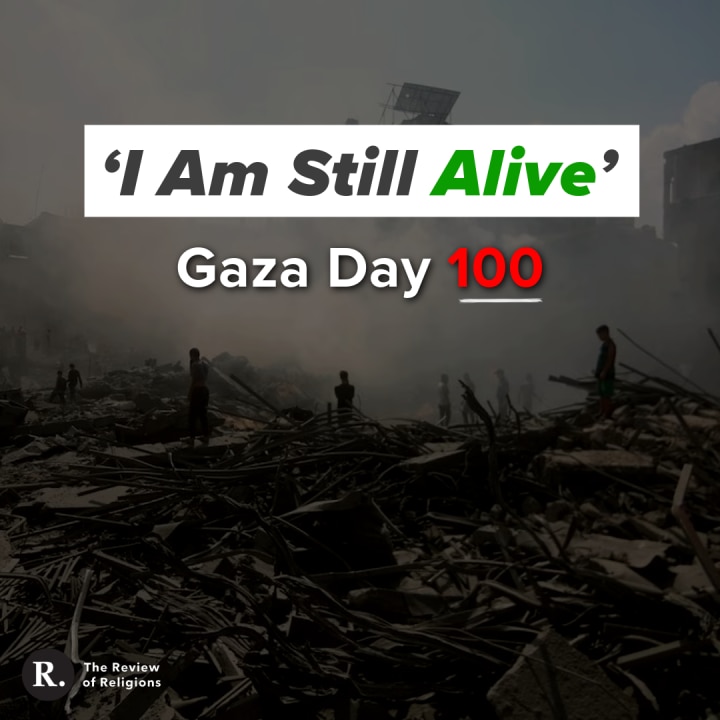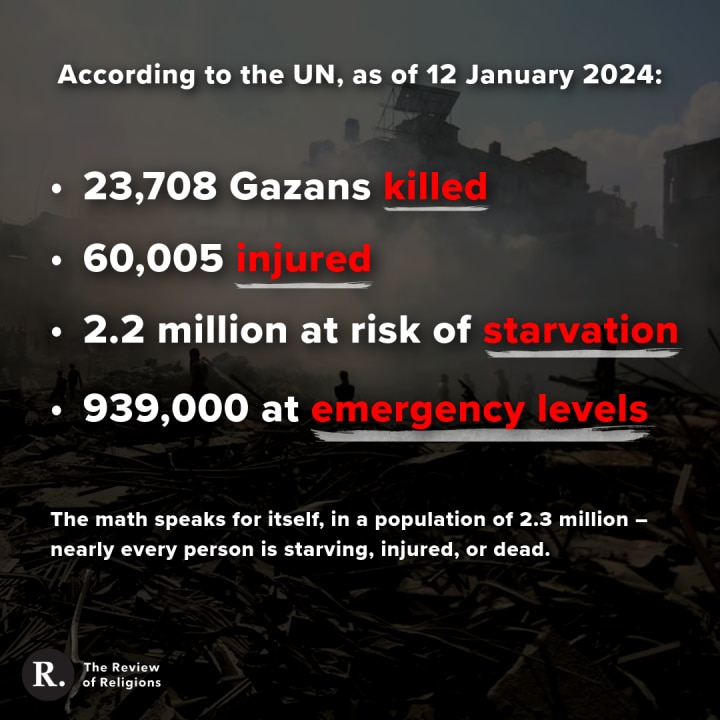
Sarah Malik, USA
January 14th marked a hundred days. One-hundred days of mass murder, of devastation, of a population slowly being buried under the rubble of their once homes.
But what of the millions who are still alive and awaiting their fate? They look at the rubble knowing that the possibility of them being under it one day is very real, because the statistics are stacked against them one way or another.
According to the UN , as of 12 January 2024, 23,708 Gazans killed, 60,005 injured, 2.2 million at risk of starvation, 939,000 at emergency levels, zero access to clean water in the north. The math speaks for itself, in a population of 2.3 million – nearly every person is starving, injured, or dead.
While the numbers alone are staggering, imagine for a moment what it’s like to be one of those 2.3 million. Those of us hearing about Gaza in the news or reading about them can never truly understand their struggles. Particularly because Gazans have mostly been cut off from the world – their voices seldom heard. Communications are frequently down, their borders are blocked, and channels for reaching the world outside or for the outside world to reach them, are practically non-existent.

It’s for this very reason that we’ve been working to give a platform to the voices of Gaza, to let them speak for themselves and for their truth to ring clearly above all else. As one can imagine, it hasn’t been easy to make contact with those on the ground in Gaza. In a most startling reality, we found the easiest way to find people in Gaza Gazan was to search ‘I am still alive’ on social media.
Gazans who somehow can manage to find cellular connection are posting ‘I am still alive’ every day, so that when a day comes they haven’t posted, the hope is that someone, somewhere will know of their fate.
We were finally able to reach Hamid, a Gazan who’s been displaced four times and is now living in a tent with his family. Hamid shared some of the realities he and his family are facing in a candid interview.
‘My house has been destroyed, my family’s house has been destroyed, my relatives’ houses have been destroyed, our farms have been destroyed. All of our dreams have been destroyed. But we will continue fighting firmly to establish peace. We will establish peace.’
Hamid shared that neighbourhoods where homes have been destroyed are now tent cities. The phrase unfortunately being quite literal – the tents are all that’s left.
‘We’re in a tent and it gets very cold at night; it does not even have any of the basic necessities.’
Even for those who live this reality every single day, they’re no less shell shocked by the truth of their new reality.
‘You see things that you would never have imagined seeing. You see people, families, even children sleeping in the open, in the cold, in the rain and you see children crying for food and water.’
And for any parent, on a normal day they might wake up worried about making breakfast for their children or getting them to school on time; not for the Gazans. They wake up and worry whether their children survived the night.
‘Whenever we wake up early in the morning, the first thing we think of is our children, death, and destruction. When we wake up we are afraid. We look for food to keep us and our children alive. We wake up in the midst of destruction and killing and we are in a state of fear and worry.’
The brutal reality is that the possibility of death seems more probable than not, simply based on the carnage they’ve had to witness. Burying the dead is one of the ways family and friends are able to find closure or pay their last respects. But as Hamid describes it, even doing that much is not possible for many who have lost their loved ones
‘Many of the bodies are blown to pieces. Many of the bodies end up remaining unknown and we can’t figure out who it is. Some of them are completely lost (under the rubble). Some of them end up being in such tiny pieces that they can’t be identified. I have many family members whom we know nothing about.’
But as night falls, in the tent cities, after a day of relentless bombings and shootings, the Palestinians still carry an inspirational mindset. Around the world, people have taken notice of the distinct resilience and patience shown by the Palestinians. Hamid’s explanation of where such determination and patience comes from is simple:
“By the grace of Allah in the Gaza strip our faith is strong. God has commanded us that when we go through trials we have to remain patient and strong…It is required of us to encourage our children and families to also be patient, to not show any weakness in front of them, even though from the inside we are grieving and completely frightened.’
The smiles of Palestinians radiate through the smokey rubble that Gaza has been reduced to. Yet the cycle never stops. Because as has become the reality in Gaza, there is always something to mourn.
‘One of the hardest things for us is when we are sitting together in a gathering and one of us receives a call saying that a member of your family is gone. Entire families have been annihilated. We’ll be sitting and smiling, and then suddenly one of us receives a call that his whole family is gone and then the entire aura changes to one of sorrow and sadness.’
It’s been no different for Hamid. He opened about some of the family he’s lost during the war. In a tone mixed with sorrow, pain and exhaustion, Hamid spoke about his cousin who had been bedridden for 22 years due to an accident. He was being helped by his brother to a hospital in northern Gaza when they were both struck by a missile and died.
‘This was one of the hardest things for me – to lose this person who had been on bed rest for 22 years, gone, just like that.’
The Israeli bombs certainly haven’t discriminated. Hamid painfully recalled another cousin he lost; a doctor, who graduated just last year. He had excelled in his studies and had a bright future of service to humanity ahead of him. When he heard that the Israeli soldiers had left the north, he went to check on his home. Turned out it wasn’t true, and this public servant was shot in the head and killed. With a tremor of pain, Hamid articulates a sentiment which can be applied to all innocent Gazans:
‘He was just a civilian; a doctor who had nothing to do with the war.’
If the plight of Gazans has shown us anything, it’s that survival certainly is relative. For those who have so far remained alive from the constant bombardment, life has been characterised by the struggle to find the basics needs of life
‘There are huge shortages of everything…There is a shortage of food, water, medicine, let alone the fear and worry that we have. When you go looking for food you are in a state of fear that a missile will be dropped on you and at the same time you are thinking of everything; your family. So many things going on in your mind. If you hear a missile being launched, you immediately think of your family.’
But Hamid hasn’t accepted defeat, not even close. He exudes a determination to never give up no matter the circumstances. It was this same determination that led him to collect donations from friends abroad and use the funds to do whatever he could to help those around him, by bringing them food, water, and whatever other basic necessities he could find.
‘Imagine when your family does not have all the basic necessities of life; water, food and medicine. Imagine once you received those things how happy you would feel. When you visit a family and you have a packet of supplies like milk for their children or some food for them, the joy that they feel is indescribable. It feels as if God’s mercy has descended upon them from the heavens.’
It’s a glimpse into what the world needs at present to bring about peace; a spirit of helping one another, of respecting one another, because no level of enmity should ever lead to any amount of bloodshed, let alone the horrendous state of affairs in Gaza. Even for people like Hamid who are facing the brunt of this brutality, it’s not about revenge, it’s about peace
‘We need governments that allow us all to live, all Jews, Christians, and Muslims to live together in love, peace and harmony. All of these religions are from God. We should all respect each other, and we should all extend our hands for peace.’
About the Author: Sarah Malik has a degree in Medical Biochemistry and is the recipient of the national American Chemical Society (ACS) award as the top student in the nation for her contribution to research and academic performance in Organic Chemistry. Sarah is a Masters student studying to become a Physician Assistant. She is a member of The Existence Project team and serves as the Executive Producer of the ‘Power of Prayer’ podcast.




Add Comment